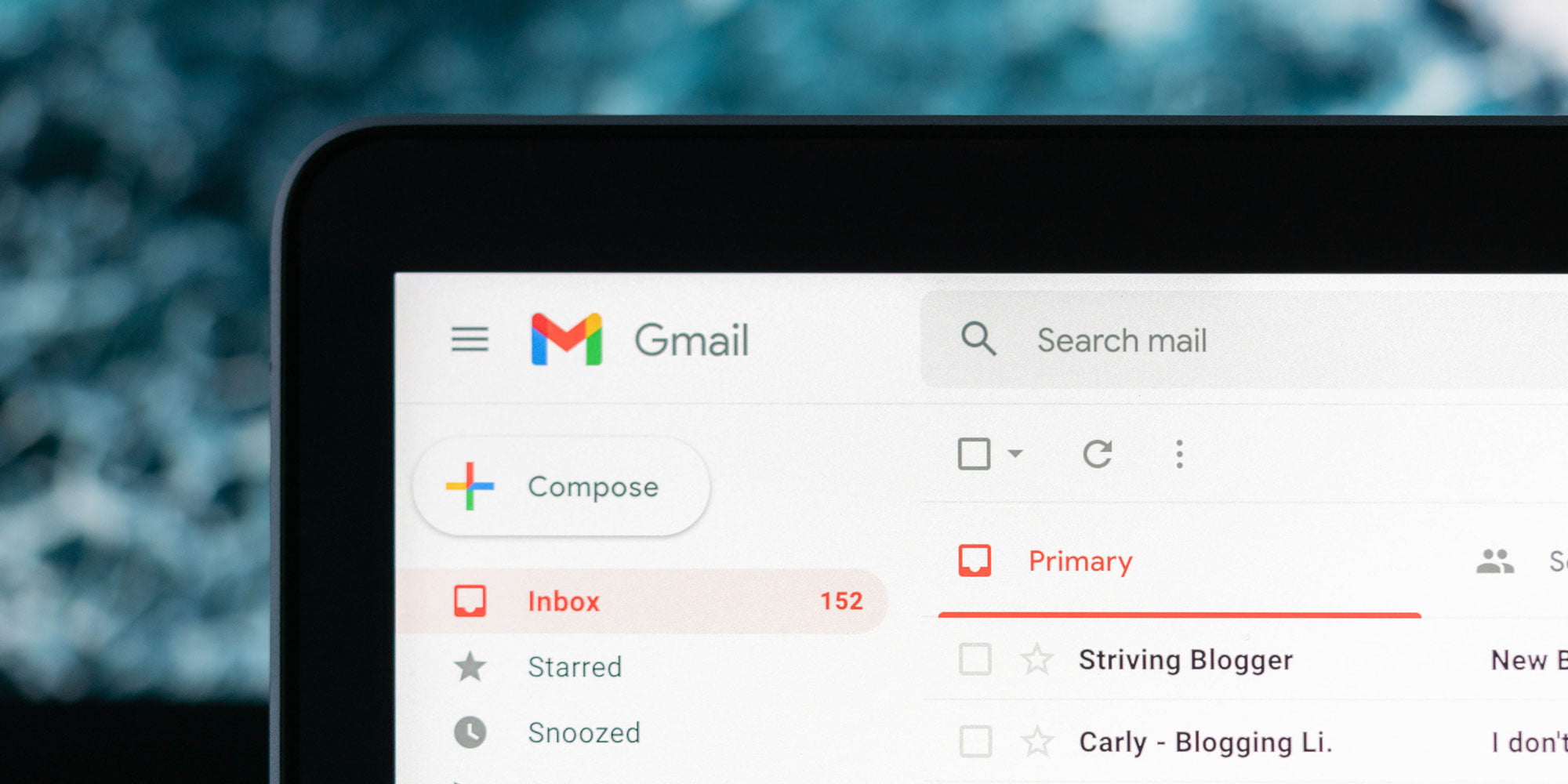When it comes to sending and receiving emails on a Windows PC, most people I know use Gmail in a web browser. Microsoft Outlook is also widely used.
However, beyond these two, there are plenty of other email apps for Windows that come with useful and unique features.
Even though chat apps have become the main way we communicate for both work and personal use, email is still essential. To handle messages more efficiently, it’s worth finding the email app that best fits your needs.
Table of Contents
- Free but Reliable Windows Email Apps
- Windows Email Apps with Free Trials
- Excluded Email Apps
- Discontinued Email Apps
- Conclusion
Free but Reliable Windows Email Apps
There are several Windows email apps that provide plenty of functionality for free. Here are some worth trying first.
Spark by Readdle
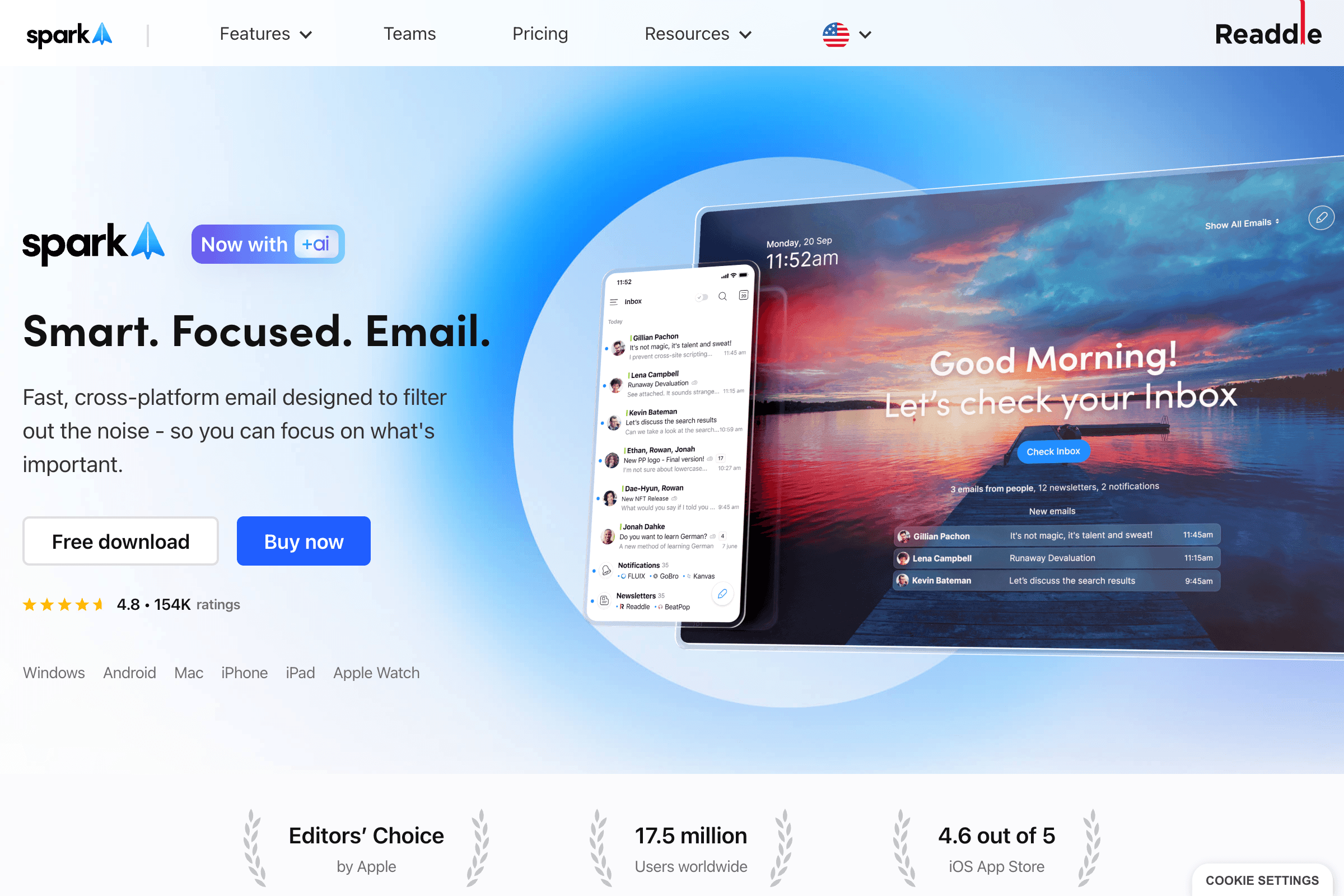
| Supported OS/Devices | Windows, Mac, iPhone, iPad, Apple Watch, Apple Vision, Android |
|---|---|
| Free Plan | Yes |
| Paid Plan | Premium (Personal): $4.99/month (billed annually), Premium (Team): $6.99/month (billed annually) |
| Supported Services | Gmail, Outlook, Office 365, Microsoft Exchange, iCloud, Yahoo!, Yahoo! Japan, Kerio Connect |
| Supported Protocols | IMAP: Yes, POP3: No |
Originally a popular free email app on Mac and iOS, Spark gained attention as an alternative after well-known apps like “Sparrow” and “Mailbox” were discontinued. In October 2022, a Windows version was also released.
Features include Smart Inbox for automatic sorting, swipe actions, calendar integration, reminders, scheduled sending, templates, and more. If you’re unsure which app to start with, Spark is a solid first choice.
The “Spark for Team” feature allows multiple users to collaborate on the same email or leave comments. This is available even on the free plan, with additional options in the paid tiers for individuals and teams.
eM Client
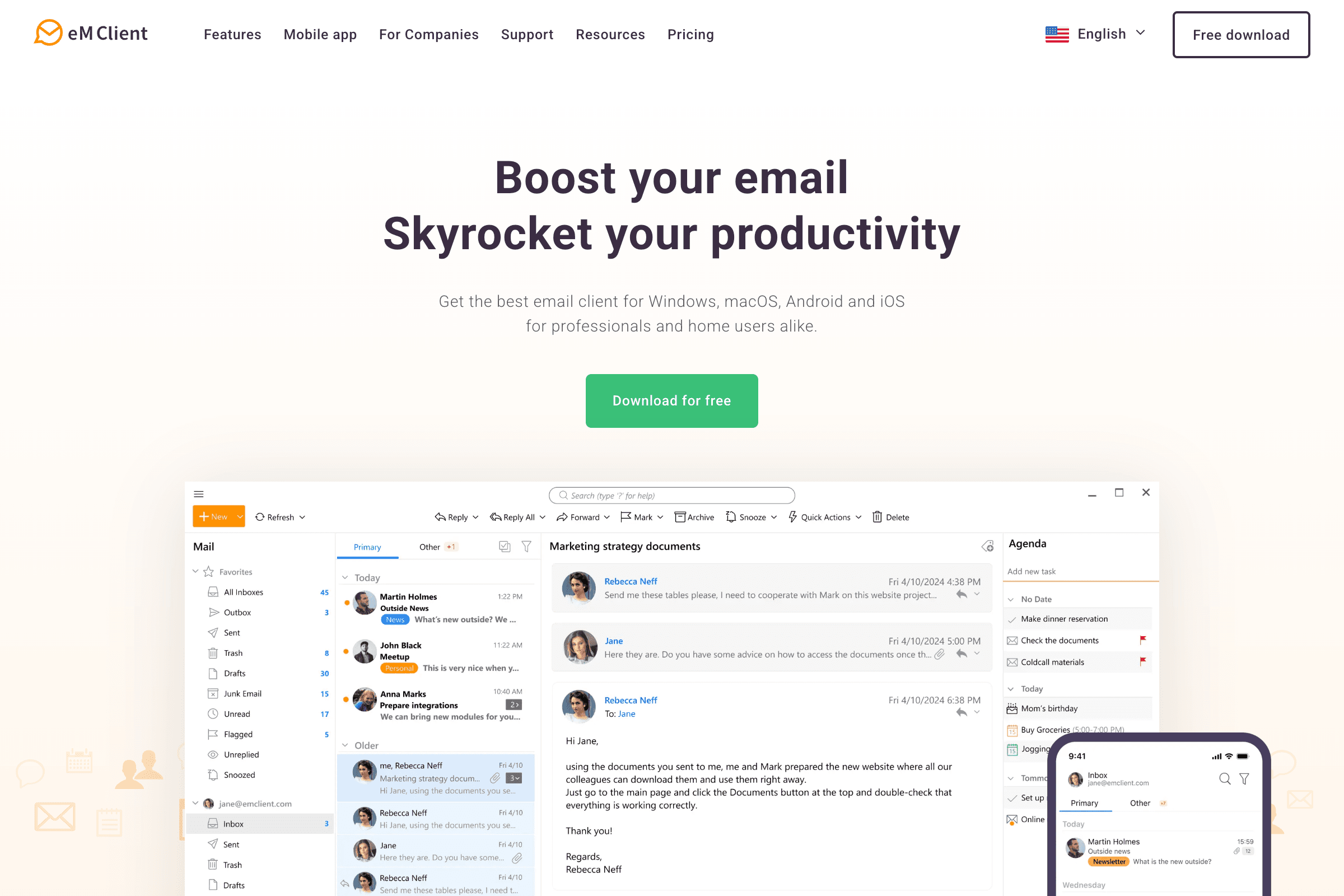
| Supported OS/Devices | Windows, Mac, iPhone, iPad, iPod touch, Android |
|---|---|
| Free Plan | Yes |
| Paid Plan | Personal : from $39.95 Business : from $49.95 |
| Supported Services | Gmail, Outlook, Office 365, Microsoft Exchange, iCloud, Yahoo!, Aol., IceWarp, SmarterMail, Kerio Connect, MDaemon, Mailfence |
| Supported Protocols | IMAP: Yes, POP3: Yes |
eM Client has recently become one of the most popular choices for Windows users. The free plan supports up to two accounts but is restricted to non-commercial use. Despite this limitation, the free version is more than enough for personal use. A Mac version was released in 2019.
It’s an all-in-one app with calendar, tasks, and chat built in. Its fast email search makes it especially useful. Overall, I recommend it over Outlook and Thunderbird.
Paid versions include “Personal” and “Business.” The Business version includes license management. Both plans are one-time purchases with no renewal fees, though major future upgrades require an additional payment unless you opt for the “Lifetime Upgrades” package.
Mailspring

| Supported OS/Devices | Windows, Mac, Linux |
|---|---|
| Free Plan | Yes |
| Paid Plan | $8/month |
| Supported Services | Gmail, Outlook, Office 365, iCloud, Yahoo!, FastMail, GMX, Yandex |
| Supported Protocols | IMAP: Yes, POP3: No |
Mailspring is a fork of the discontinued Nylas Mail (formerly Nylas N1). It’s a cross-platform, open-source app with a clean, lightweight design.
Mailspring Pro (paid) adds advanced features such as snooze, scheduled sending, email analytics, and read receipts.
Spike
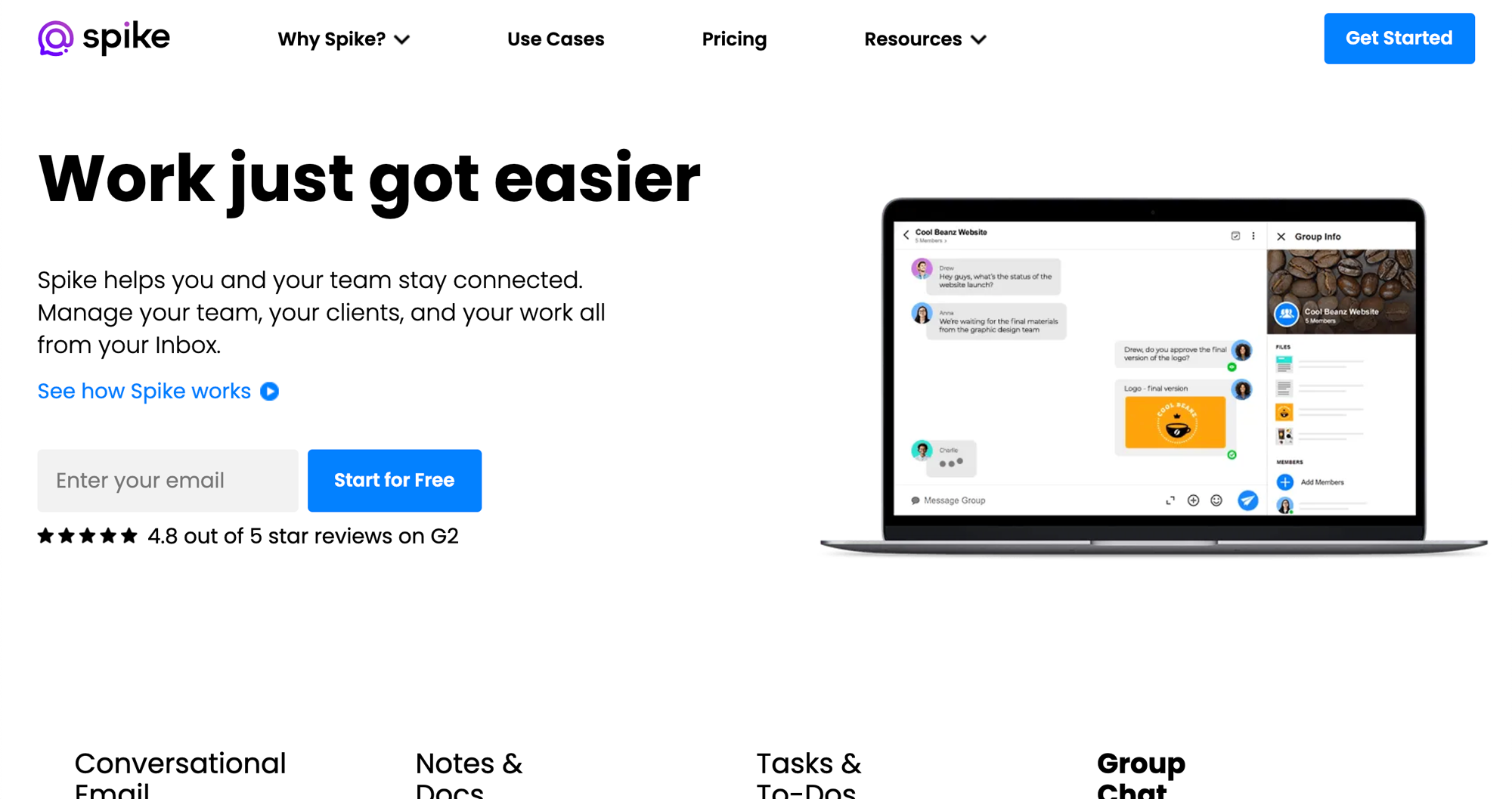
| Supported OS/Devices | Windows, Mac, iPhone, iPad, iPod touch, Apple Vision, Android, Web |
|---|---|
| Free Plan | Yes |
| Paid Plan | Pro : from $5/month Business : from $10/month |
| Supported Services | Gmail, Outlook, Office 365, Microsoft Exchange, iCloud, Yahoo!, Aol., mail.ru |
| Supported Protocols | IMAP: Yes, POP3: No |
Spike turns email into a chat-like interface, resembling Slack or messenger apps. Headers and signatures are hidden, making it easier to focus on the main content. Important emails are also highlighted. It includes calendar, tasks, and notes features.
You can also create groups for team communication within Spike. Since most people already use other chat apps, switching entirely to Spike may be difficult. Still, if you often go back and forth with the same contacts, Spike can be very convenient.
Thunderbird
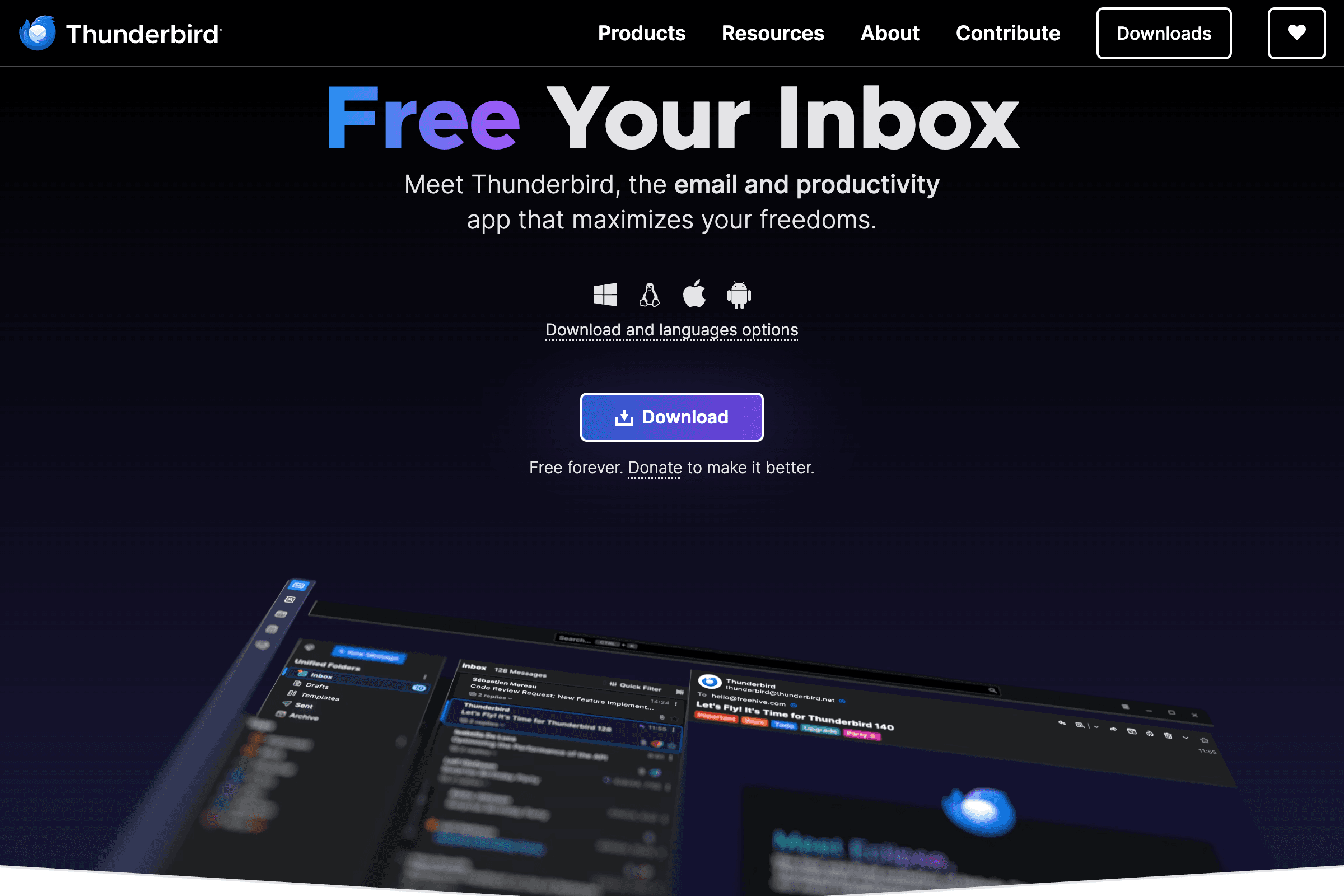
| Supported OS/Devices | Windows, Mac, Android, Linux |
|---|---|
| Free Plan | Yes |
| Paid Plan | No |
| Supported Services | Gmail, Outlook, Office 365, Mailfence, Gandi Mail, Yahoo!, GMX, Fastmail |
| Supported Protocols | IMAP: Yes, POP3: Yes |
Thunderbird, developed by Mozilla, has been around since 2003. It supports multiple accounts, spam filtering, and more, all while remaining fast and reliable.
In July 2023, the app received a major UI update for a more modern look. Integration with Gmail and iCloud works smoothly, and it runs well on macOS. Best of all, it’s completely free and doesn’t show ads.
BlueMail
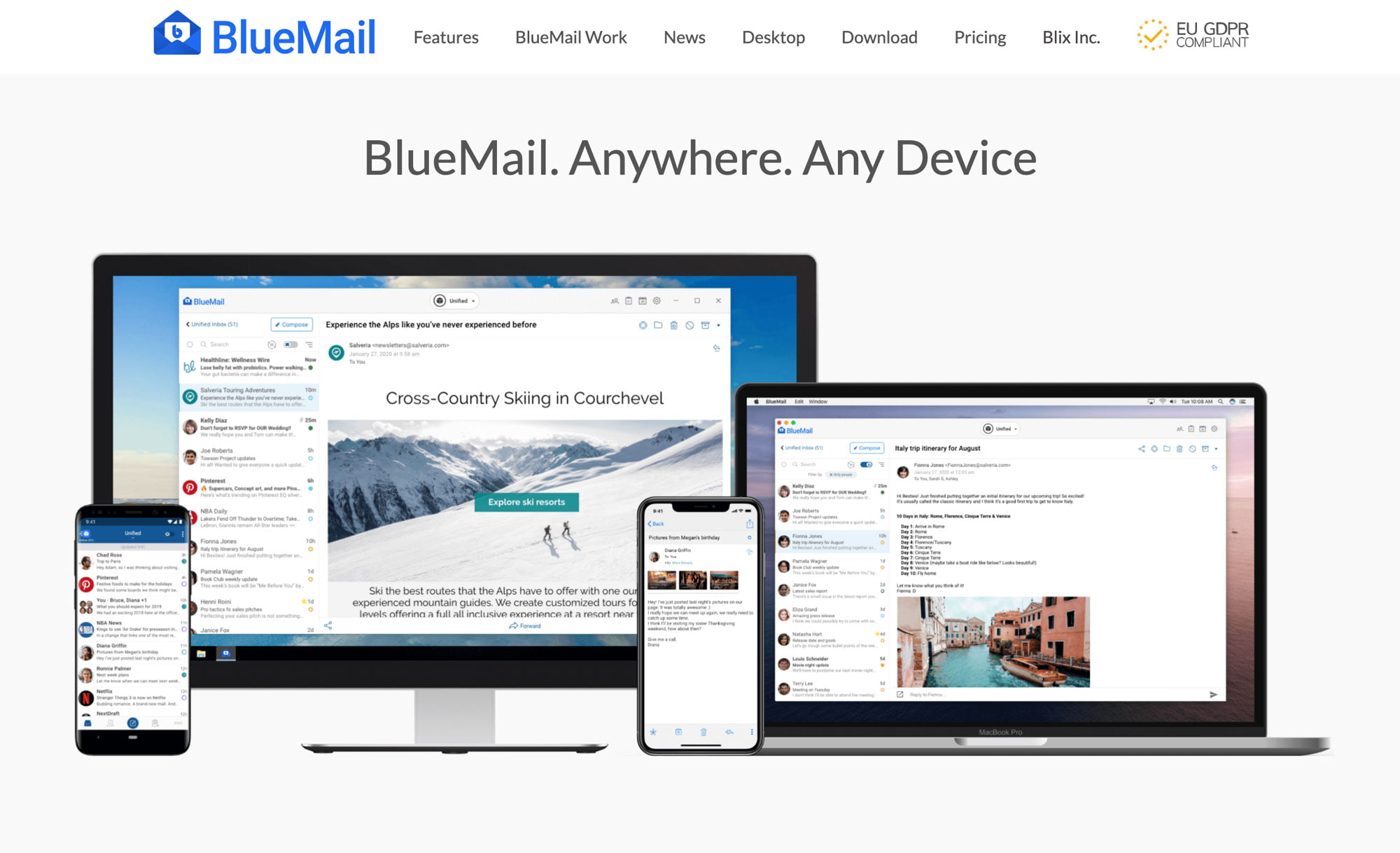
| Supported OS/Devices | Windows, Mac, iPhone, iPad, iPod touch, Apple Vision, Android, Linux |
|---|---|
| Free Plan | Yes |
| Paid Plan | BlueMail Plus : $5/month, $49/year Business Pro : $12/month, $99/year |
| Supported Services | Gmail, Outlook, Office 365, Microsoft Exchange, iCloud, Yahoo!, Aol. |
| Supported Protocols | IMAP: Yes, POP3: Yes |
BlueMail supports a wide range of platforms and includes most features for free. It allows you to merge multiple accounts into a single inbox. The app also includes a calendar and a unique Kanban-style “Read Later” feature.

Personally, I find the UI a little clunky and not as refined as other apps, but if you’re looking for a no-cost option, it’s worth a try.
Canary Mail
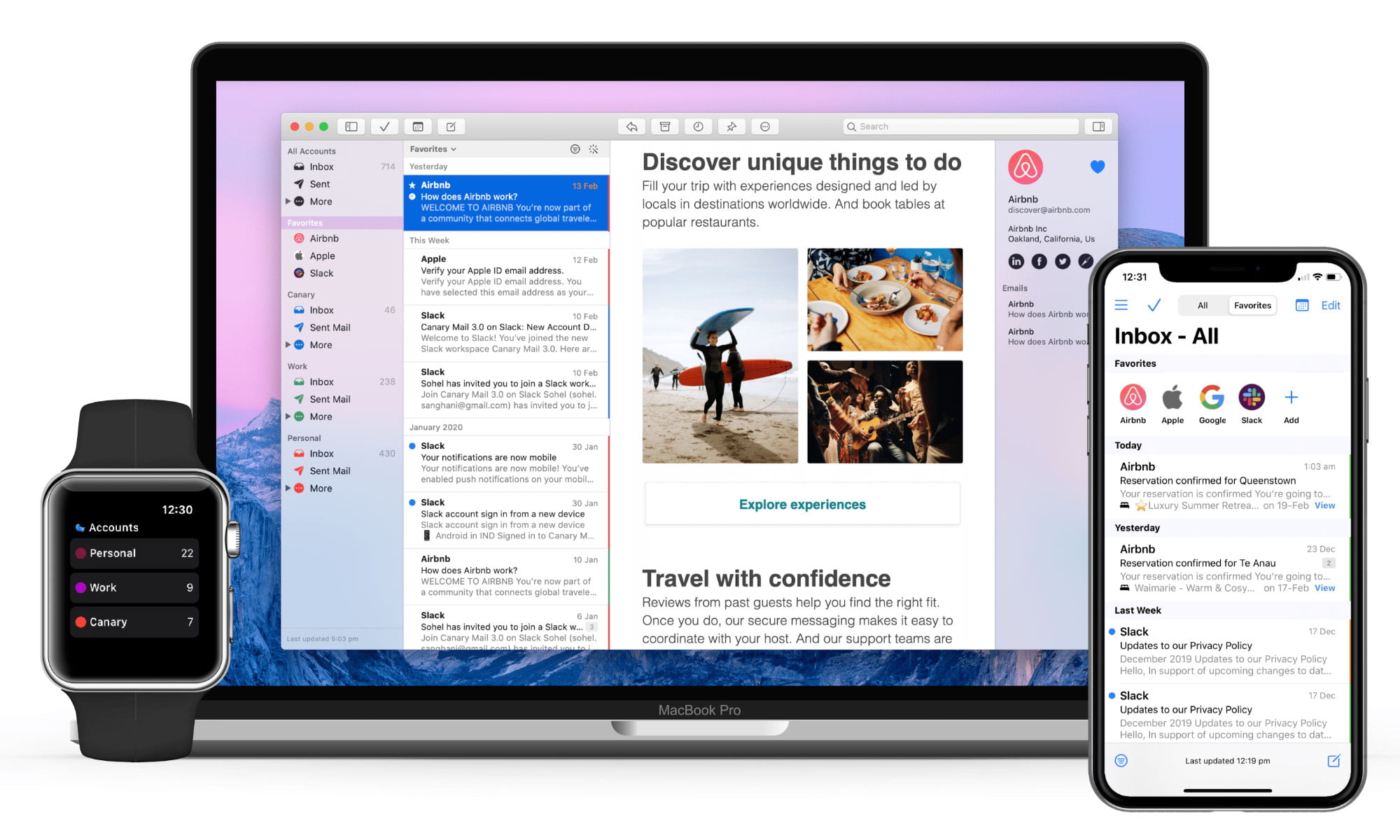
| Supported OS/Devices | Windows, Mac, iPhone, iPad, iPod touch, Apple Watch, Apple Vision, Android |
|---|---|
| Free Plan | Yes |
| Paid Plan | Growth:$3/month Pro+:$10/month |
| Supported Services | Gmail, Office 365, Microsoft Exchange, iCloud, Yahoo! |
| Supported Protocols | IMAP: Yes, POP3: No |
This app focuses on security and encryption. While it also has features like notifications, snooze, and templates, I chose not to test it based on personal preference.
Windows Email Apps with Free Trials
The following apps are paid but include a free trial period so you can test them before committing.
Mailbird
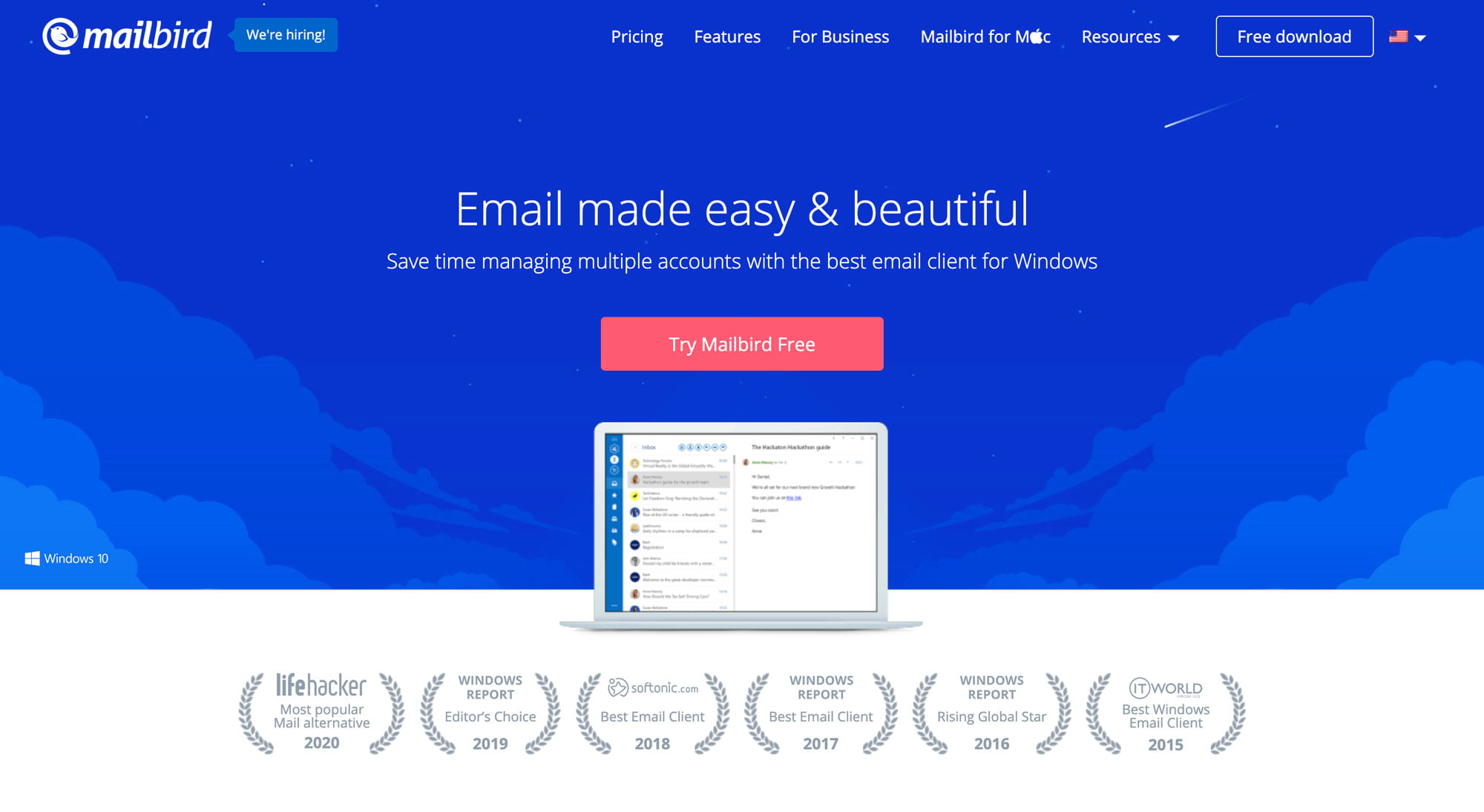
| Supported OS/Devices | Windows, Mac |
|---|---|
| Free Plan | Yes (3-Day Free Trial) |
| Paid Plan | Premium: $5.75/month (annual billing), Lifetime: $99.75 (+$20 for lifetime upgrades) |
| Supported Services | Gmail, Outlook, Microsoft Exchange, iCloud, Yahoo!, Aol. |
| Supported Protocols | IMAP: Yes, POP3: Yes |
Mailbird has a simple interface and supports a unified inbox across multiple accounts. It feels a bit slower compared to eM Client. The previous free plan seems to have been discontinued.
It also integrates with apps like Facebook, Twitter, Chrome, Dropbox, Asana, Slack, Google Drive, and more, allowing you to use them directly within Mailbird. A Mac version was released in October 2024.
Polymail

| Supported OS/Devices | Windows, Mac, iPhone, iPad, iPod touch, Apple Vision |
|---|---|
| Free Plan | Yes (7-Day Free Trial) |
| Paid Plan | Basic: $10/month Premium: $24/month Enterprise: $49/month |
| Supported Services | Gmail, Outlook, Office 365, iCloud, Yahoo!, FastMail |
| Supported Protocols | IMAP: Yes, POP3: No |
Polymail is built for team productivity, offering shared inboxes and co-editing features. Personally, I don’t find the team tools particularly appealing, but being able to share directly to Slack and Asana is convenient. Out of all the apps I tested, I liked Polymail’s UI the best. At $10/month, it may be worth it even for personal use.
Kiwi for Gmail
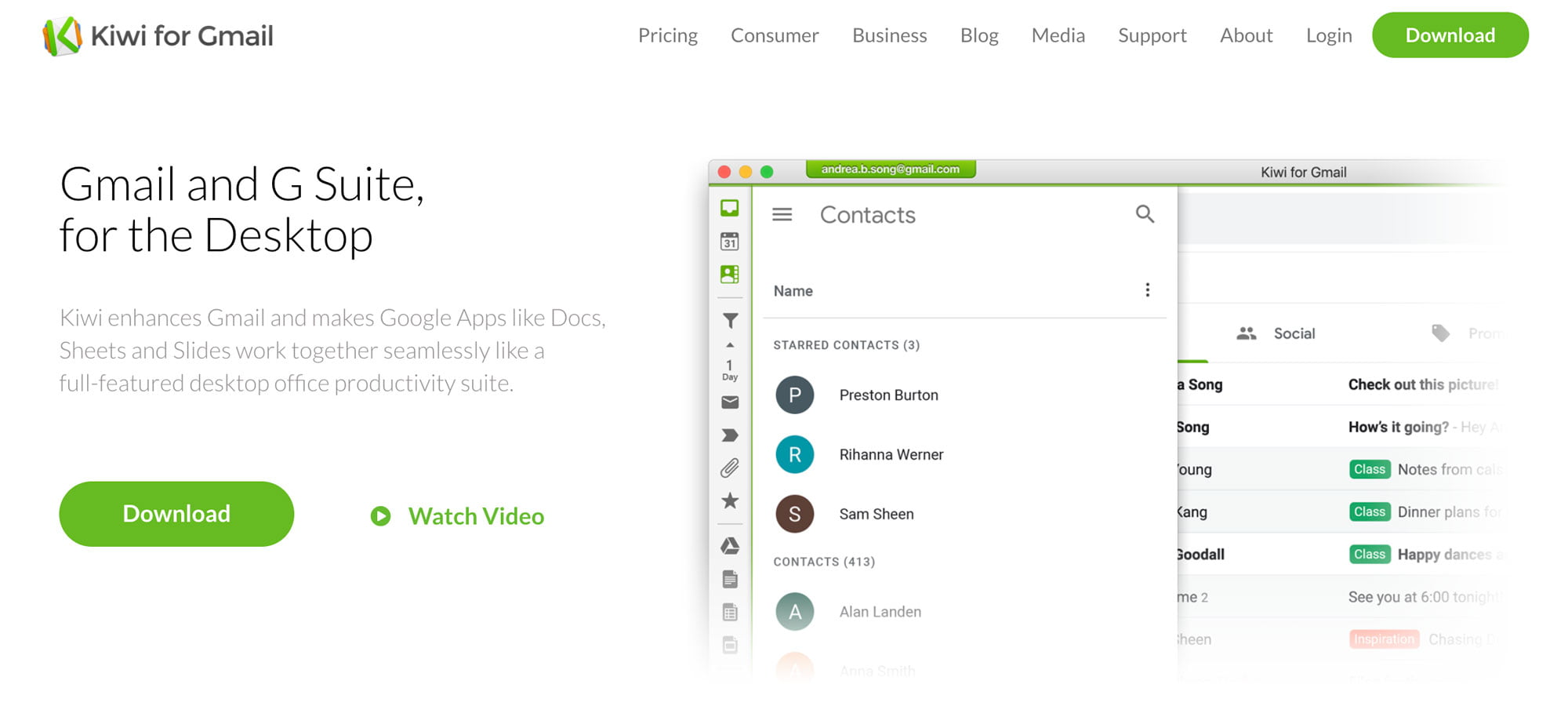
| Supported OS/Devices | Windows, Mac |
|---|---|
| Free Plan | Yes (7-Day Free Trial) |
| Paid Plan | Starter: from $4/month Pro: from $6/month Power Pro: from $8/month |
| Supported Services | Gmail |
| Supported Protocols | IMAP: No, POP3: No |
Kiwi is a feature-rich Gmail client for Windows and Mac. It lets you access not only Gmail but also Google Docs, Sheets, Slides, Calendar, and Drive directly.
Being able to create and edit Docs and Sheets within Kiwi is convenient, though the app feels heavier compared to others. A free plan was available in the past, but it appears to have been discontinued.
Excluded Email Apps
I decided not to test the following email apps, either because they are already well-known or because I don’t prefer their interface.
Mail (Windows Built-in)
The default Windows Mail app has a simple interface and limited features. Compared to other apps, it falls short, so I excluded it.
Microsoft Outlook
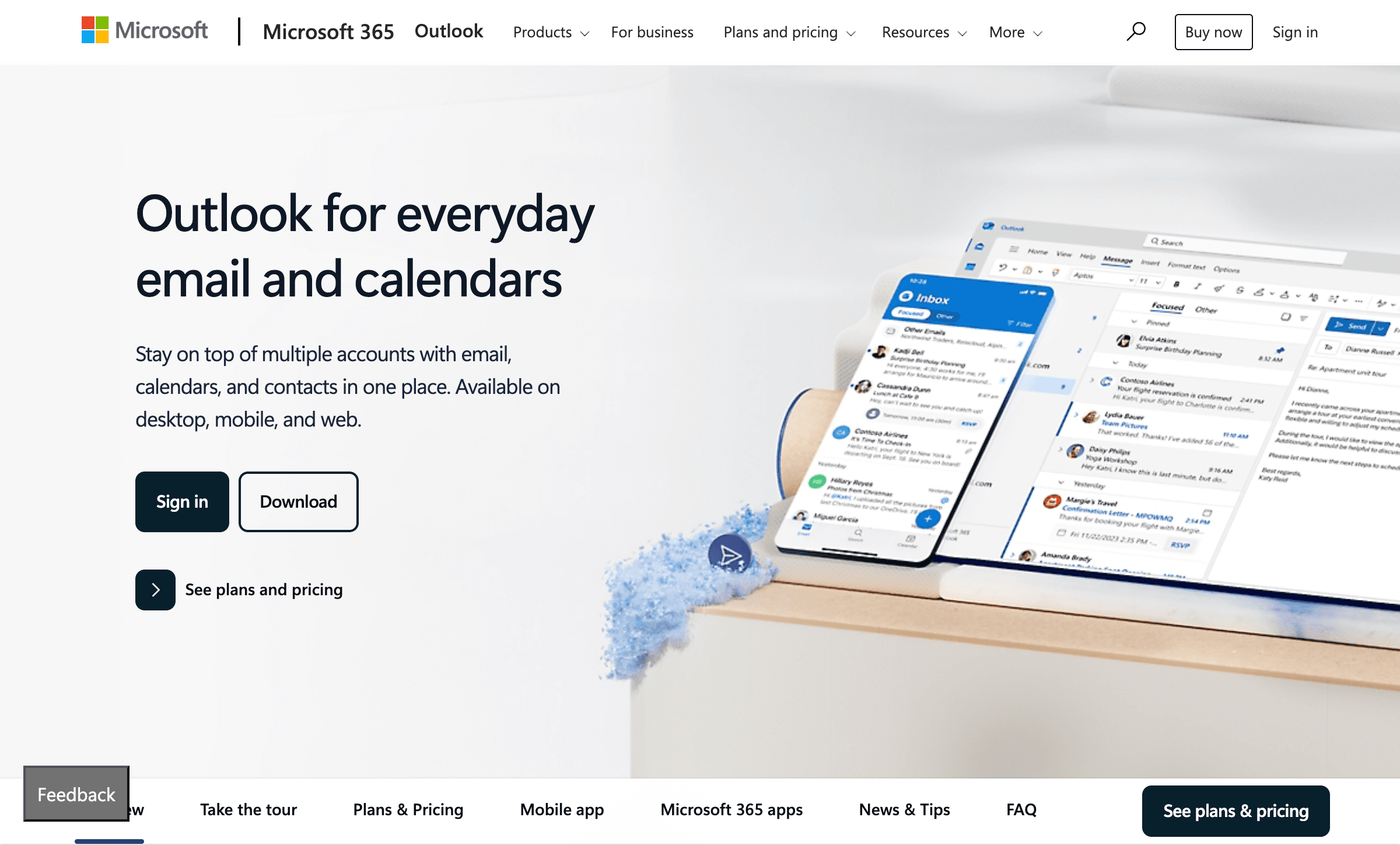
https://www.microsoft.com/en-us/microsoft-365/outlook/email-and-calendar-software-microsoft-outlook
| Supported OS/Devices | Windows, Mac, iPhone, iPad, Apple Watch, Android, Web |
|---|---|
| Free Plan | Yes |
| Paid Plan | Subscription to Microsoft 365 |
| Supported Services | Microsoft account, Gmail, Yahoo!, iCloud, and others |
| Supported Protocols | IMAP: Yes, POP3: Yes |
Microsoft Outlook is a comprehensive email application that is widely used around the world. In addition to sending and receiving emails, it offers features such as calendar, task management, and integrated contact management, making it suitable for both business and personal use. It also allows you to manage multiple accounts in one place and comes with powerful search capabilities and robust spam protection.
One of its major strengths is its high compatibility with Microsoft 365, enabling seamless integration with Word, Excel, Teams, and other services.
Many people may be using Outlook, but there are plenty of other email applications that are more convenient. I encourage you to try the ones introduced in this article.
Discontinued Email Apps
The following email apps have unfortunately been discontinued.
Postbox
On October 22, 2024, it was announced that Postbox had been acquired by eM Clinet. Since I personally liked Postbox, this is a bit disappointing.
That said, eM Clinet is also introduced in this article, and it’s a highly recommended email app that I encourage you to try.

| Supported OS/Devices | Windows, Mac |
|---|---|
| Free Plan | Yes (30-Day Free Trial) |
| Paid Plan | Lifetime License : $49 |
| Supported Services | Gmail, Office 365, Outlook, iCloud, Yahoo!, Aol., FastMail, ProtonMail |
| Supported Protocols | IMAP: Yes, POP3: Yes |
You can organize multiple email accounts into custom groups and check all emails within each group in a single inbox. For me, this is extremely convenient. By grouping addresses for work, personal use, and so on, managing incoming messages becomes much more efficient. (I really wish other email apps would adopt this grouping feature as well.)
In addition, the ability to use placeholders in email templates—automatically inserting items such as dates or sender names—makes it very appealing in terms of functionality. That said, the app feels a bit sluggish when it comes to loading and searching emails.
Newton Mail
The service was discontinued on July 31, 2024.

| Supported OS/Devices | Windows, Mac, iPhone, iPad, Android, Linux |
|---|---|
| Free Plan | Yes(14-Day Free Trial) |
| Paid Plan | $49.99/year |
| Supported Services | Gmail, Outlook, Office 365, Microsoft Exchange, iCloud, Yahoo! |
| Supported Protocols | IMAP: Yes, POP3: No |
It was originally released as CloudMagic and rebranded as Newton Mail in 2016. It gained attention for its fast search capabilities. After two service shutdowns, it was relaunched in May 2020 and continues to this day.
Personally, I find it frustrating that you cannot view the message list and the email content on the same screen. On the other hand, it supports a unified inbox for multiple accounts and includes features like snooze and scheduled sending. With its modern UI, it’s worth a try if you’re interested.
Conclusion
After trying many different apps, Spark and eM Client stood out the most. Spark is great for team collaboration and modern features, while eM Client offers excellent integration with calendars and tasks. Depending on your preferences for UI and workflow, either one would be a strong choice for 2025.
